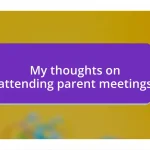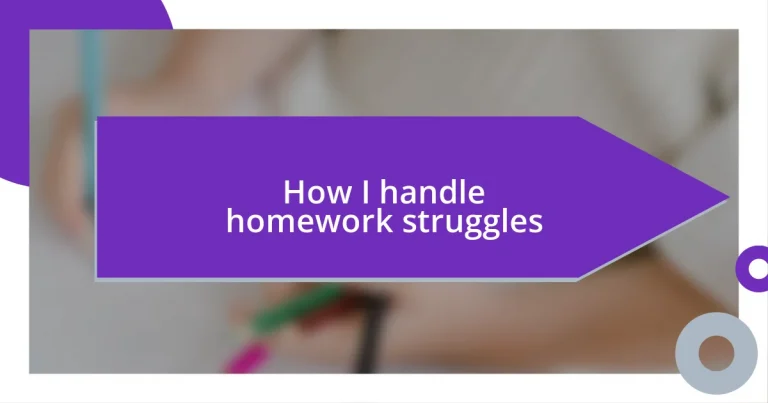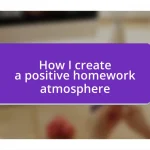Key takeaways:
- Common homework issues include procrastination, misunderstanding assignments, and poor time management; identifying these problems is the first step to overcoming them.
- Understanding your learning style—visual, auditory, kinesthetic, or reading/writing—can enhance study effectiveness and reduce frustration.
- Implementing effective study techniques, such as the Pomodoro Technique and active learning, alongside celebrating small successes, can significantly boost motivation and productivity.
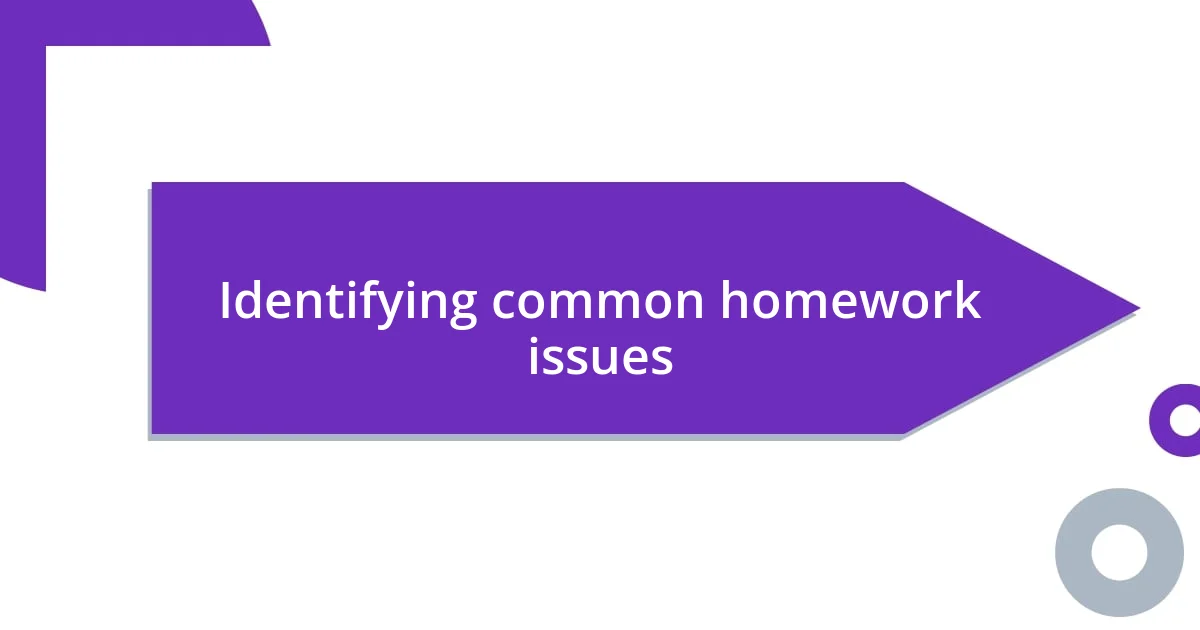
Identifying common homework issues
One of the most common homework issues I’ve encountered is procrastination. I can still remember those late nights in college when I convinced myself that I worked better under pressure, only to end up feeling overwhelmed and unprepared. Doesn’t it feel like the more you procrastinate, the bigger the task looms over you?
Another issue is misunderstanding assignments. There were times when I thought I fully comprehended what was required, only to realize I had missed key details after turning in my work. The frustration that follows is intense—how many times have you wished for a simple clarification to avoid that sinking feeling when grades come back?
Time management is also a significant hurdle. Balancing homework with other responsibilities can feel daunting. I distinctly recall a week packed with tests and assignments, where I had to prioritize tasks urgently, often sacrificing quality for speed. Have you ever felt like there just aren’t enough hours in the day to accomplish everything? It’s a tough battle, but recognizing these issues is the first step toward tackling them effectively.
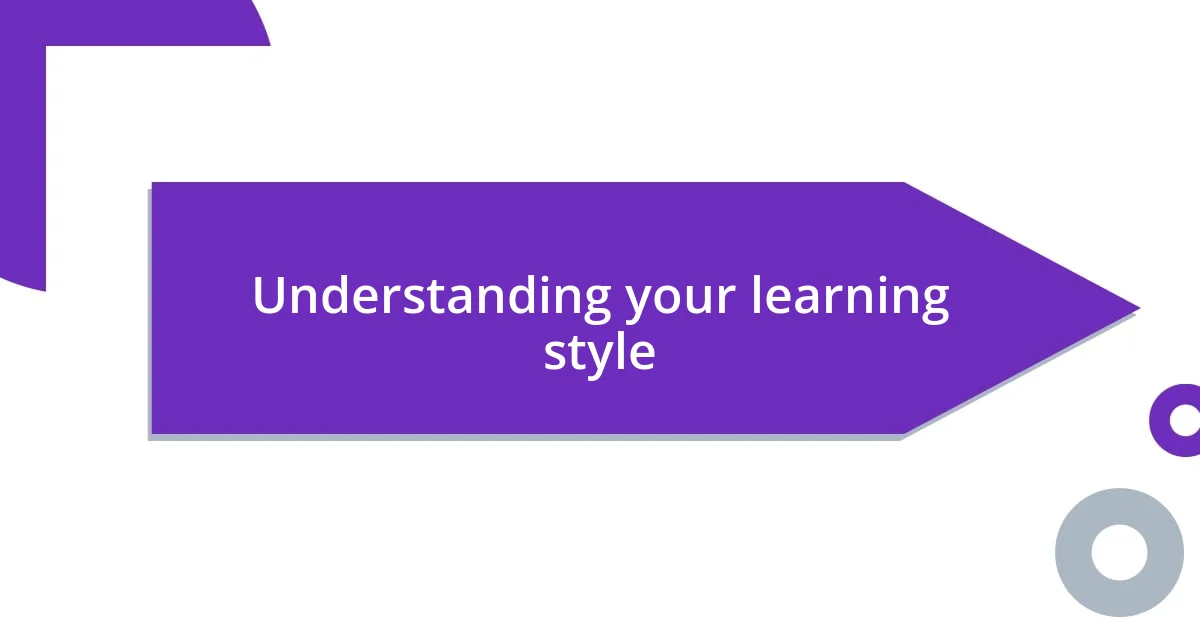
Understanding your learning style
Understanding your learning style is critical to effectively tackling homework struggles. From my own experience, I’ve discovered that knowing whether you’re a visual, auditory, or kinesthetic learner can dramatically change your approach. For instance, when I shifted to creating mind maps and diagrams as a visual learner, I found that complex topics became much more digestible. It’s a game-changer to align your study techniques with how you learn best—it can take the frustration out of homework.
Here are a few indicators that can help you identify your learning style:
– Visual Learners: Prefer diagrams, charts, and visual aids to understand information.
– Auditory Learners: Excel when they listen to lectures or discuss ideas out loud.
– Kinesthetic Learners: Grasp concepts better through hands-on activities and real-life examples.
– Reading/Writing Learners: Benefit from written text like textbooks and notes for absorbing information.
Recognizing your style can empower you and create a more productive study environment. How liberating it is to realize that studying doesn’t have to be a one-size-fits-all approach!
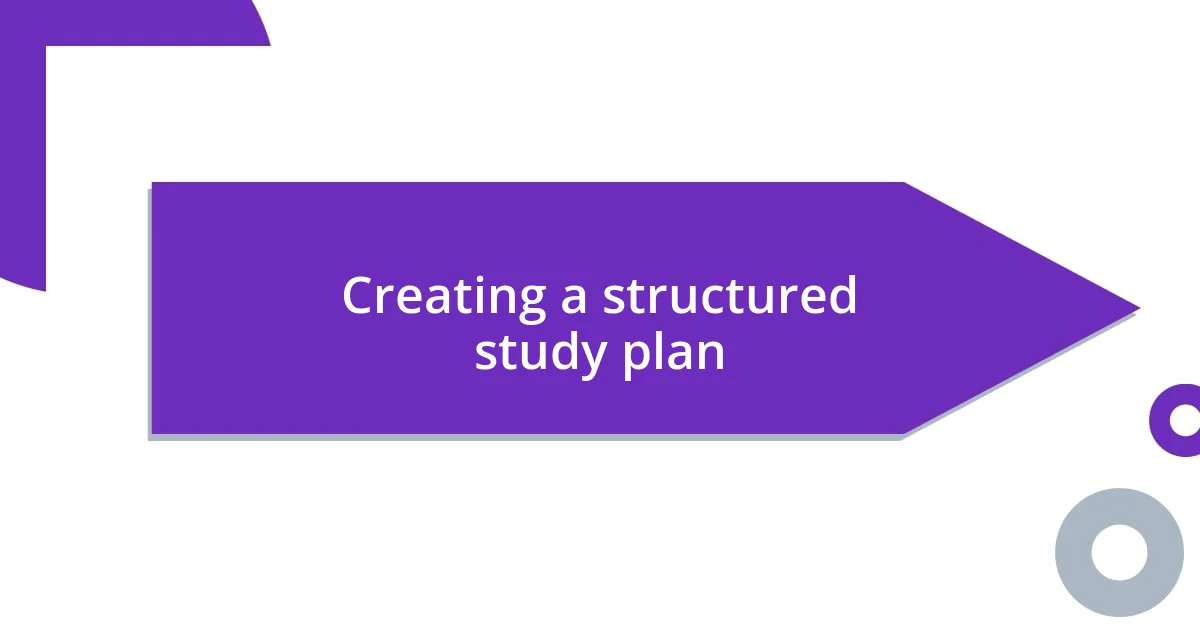
Creating a structured study plan
Creating a structured study plan can feel overwhelming at first, but it’s truly one of the most effective tools I’ve found for managing homework struggles. When I first started utilizing a study plan in college, I noticed it was like having a map to guide me through the chaos of assignments and deadlines. Visualizing what I needed to accomplish each week made tackling my homework feel less daunting and more achievable.
Breaking tasks into smaller, digestible pieces is crucial. I remember the relief I felt the first time I laid out my assignments by day and subject. Instead of cramming everything into one evening, I allocated specific time blocks for each task. This not only improved my focus but also reduced stress—there’s something incredibly satisfying about checking off each item on my list.
Here’s a simple comparison to illustrate the differences between an unstructured approach and a structured study plan:
| Unstructured Study | Structured Study Plan |
|---|---|
| Overwhelming daily tasks | Clear daily goals |
| Last-minute cramming | Consistent study habits |
| Feeling lost | Confidence in preparation |
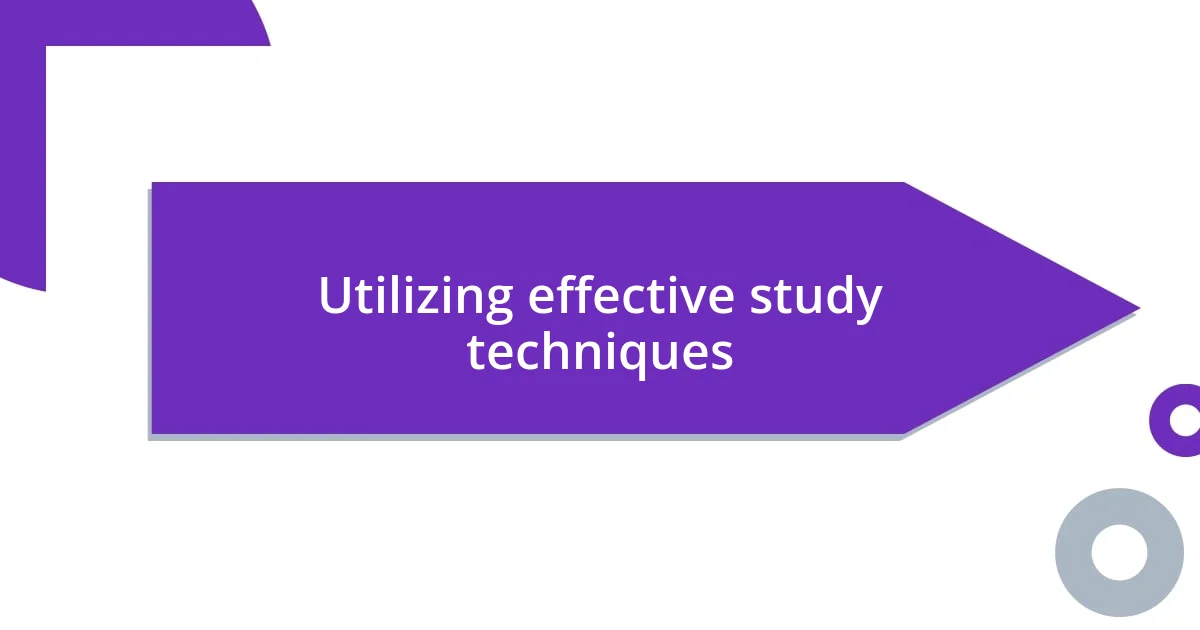
Utilizing effective study techniques
When it comes to homework, utilizing effective study techniques can truly transform your experience. I vividly recall the times I’d dive into textbooks, feeling lost amid endless information. One technique that has significantly helped me is the Pomodoro Technique, which involves studying in short bursts followed by brief breaks. This method not only maintained my focus but also made my study sessions feel more energetic and productive. Have you ever noticed how quick breaks can refresh your mind? I certainly have!
Another approach I found beneficial is the concept of active learning. Instead of passively reading or highlighting, I engage with the material by asking myself questions and summarizing what I’ve learned. I remember a particularly tough physics chapter where I created flashcards to challenge myself. The process of testing my knowledge turned that daunting content into manageable bites. How satisfying it was to see my understanding deepen!
Additionally, I’ve discovered the power of teaching others as a study technique. When I struggled with algebra, I often discussed concepts with a friend who was also struggling. Explaining topics to someone else not only reinforced my knowledge but made learning more enjoyable. Have you ever tried explaining a challenging concept? You might just be surprised by how much you learn in the process!
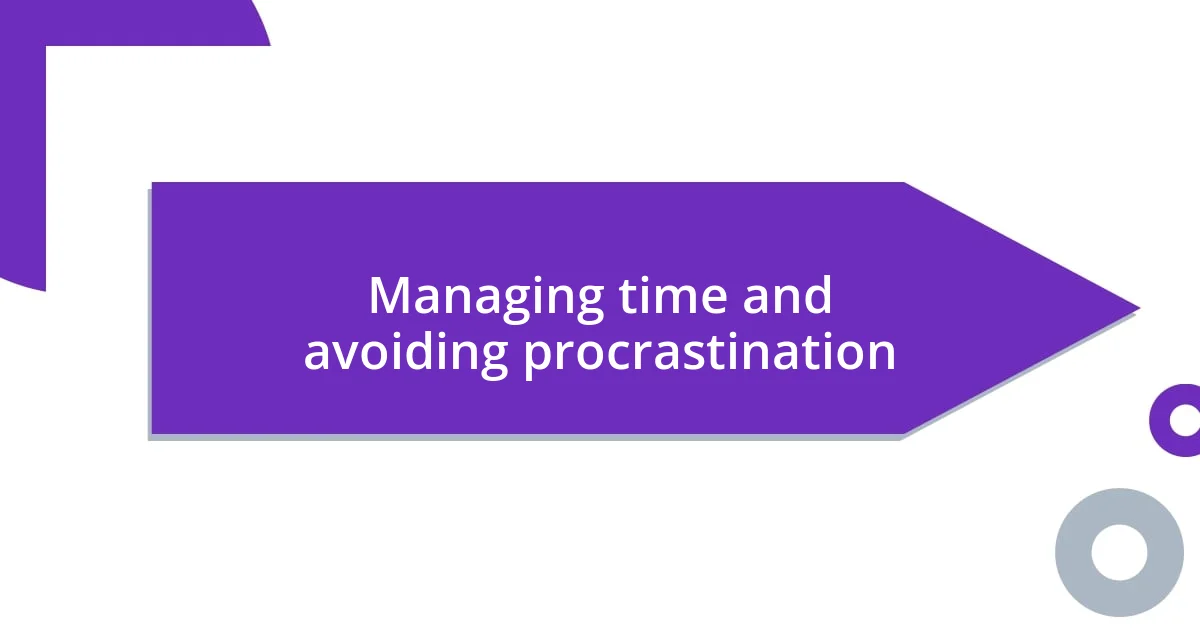
Managing time and avoiding procrastination
I’ve learned that managing time effectively is a game changer in avoiding procrastination. One strategy that consistently works for me is setting clear deadlines for each task. I recall a time when I had multiple projects due in the same week—you can imagine the chaos! By breaking them down and assigning personal deadlines before the official ones, I found I could stay ahead of the game and avoid that last-minute scramble. It felt liberating to have a plan instead of a looming cloud of tension hanging over my head.
Another crucial aspect of managing time is minimizing distractions. I used to be easily lured into scrolling on my phone or getting lost in YouTube rabbit holes. Have you ever found yourself 30 minutes into a video instead of working on your homework? I definitely have! Now, I create a dedicated study space, free of distractions, and put my phone in another room. It’s amazing how much more I can accomplish when I’m not sidetracked by notifications or temptations.
One tactic that I find particularly helpful is the two-minute rule. If a task takes less than two minutes to complete, I tackle it immediately. This approach not only clears small tasks off my plate but creates a positive momentum for larger ones. I remember when I adopted this rule during my busy exam preparation. It truly transformed my productivity. Have you tried it? You might be surprised at how quickly you can chip away at your workload and keep procrastination at bay.
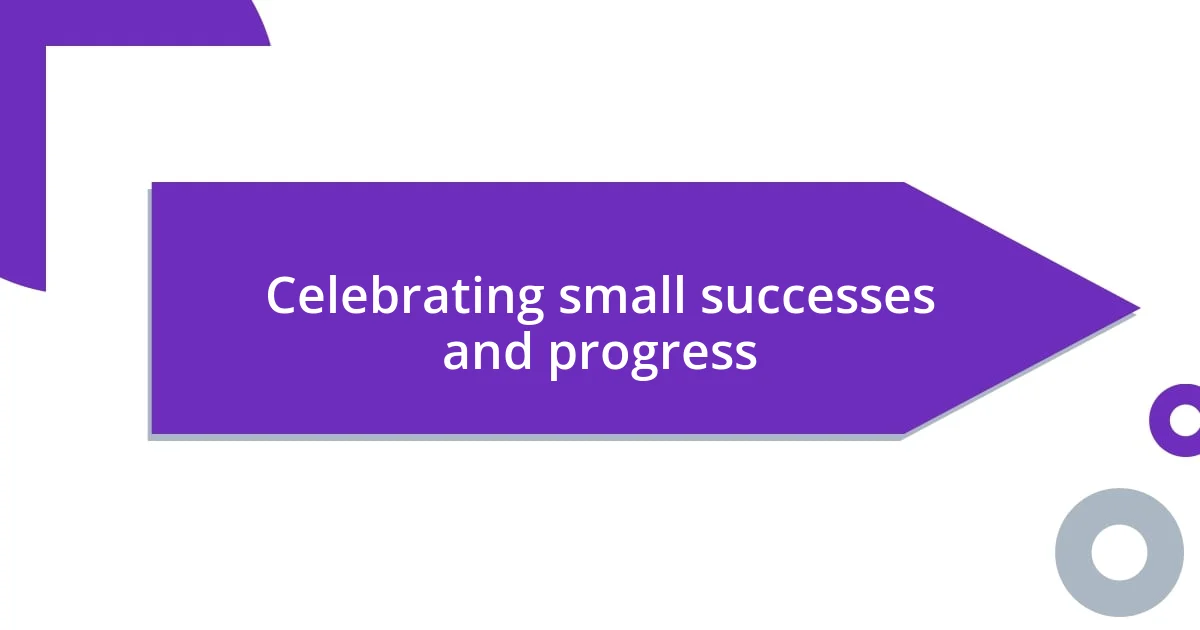
Celebrating small successes and progress
Celebrating small successes can genuinely shift your perspective. I remember when I finally grasped a concept in calculus after struggling for weeks. Instead of rushing to the next topic, I took a moment to acknowledge that small win, treating myself to my favorite snack. It was a simple reward, but it made me feel accomplished. Have you noticed how a tiny celebration can boost your motivation?
Progress doesn’t always have to be monumental to be meaningful. I often keep a homework journal where I jot down even the simplest tasks completed, like finishing reading a chapter or solving a tricky problem. Looking back at those entries reminds me of my journey and helps me appreciate how far I’ve come. It’s like visual proof that every effort counts, even the small ones. Isn’t it rewarding to see your hard work reflected in written form?
I’ve also found that sharing my achievements with friends or family can amplify joy. When I completed a challenging assignment ahead of time last semester, I called a close friend to share the news. Listening to her cheer for me felt invigorating! It’s surprising how sharing these small milestones can strengthen your resolve. Have you ever thought about how celebrating progress, no matter how small, can create a supportive cycle of motivation in your life?







